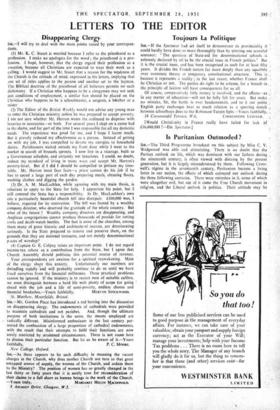LETTERS TO THE EDITOR
Disappearing Clergy-
Slit.-1 will try to deal with the main points raised by your correspon- dents.
(1) Mr.-K. C. Stuart is worried because I refer to the priesthood as a profession. I make no apologies for the word ; the priesthood is a pro- fession. -I hope, however, that the clergy regard their profession as a vocation, because all Christians are expected to treat their work as. a calling. I would suggest to Mr. Stuart that a reason for the wsakness of the Church is the attitude of mind, expressed in his letters, implying that one set of rules applies to the parson and another set to the layman. The Biblical doctrine of the priesthood of all believers permits no such dichotomy If a Christian who happens to,be a clergyman may not seek just conditions of employment, a similar ban should be placed on the Christian who happens to be a schoolmaster, a surgeon, a Witcher or a miner (2) The Editor of the British Weekly would not advise any young man to enter the Christian ministry unless he was prepared to accept poverty. I am not sure whether Mr. Herron wants the ordinand to dispense with luxuries or necessities—or both. For several years I slept on a.camp bed in thc slums, and for part of the time I was responsible for all my domestic needs. The experience was good for me, and I hope I learnt much. But it gravely reduced my effectiveness as a •parson. Instead of getting on with my job, I was compelled to devote my energies tp household duties. Parishioners waited outside my front door. while I went to the market in search of brussels sprouts. I now live in a vicarage, built to a Government schedule, and certainly- not luxurious. 1-could, no doubt, reduce my standard of living in many ways and accept Mr. Herron's poverty-level. But if-1 did I should be compelled to jettison my time- table. Mr. Herron 'must face facts—a priest cannot do his ji313 if he has to spend a large part of each day preparing meals, cleaning .floors, washing clothes and digging the garden.
(3). Dr. ,A. M. MacLacl3lan, while agreeing with my main thesis,, is reluctant to apply to the State for help. I appreciate his point, but--I. still contend the State has a responsibility. In Dr. MacLachlan's own city a particularly beautiful church fell into disrepair. £100,000 tvas, I believe, required for its restoration. The bill was footed by, a wealthy company director, who deserved the gratitude of the whole country.' But what of the future ? Wealthy company, directors are disappearing, and Anglican congregations cannot produce thousands of poutids for rotting roofs and death-watch beetles. The fact is some of the churches, among them many of great historic and architectural interest, are deteriorating seriously.': Is the State prepared to restore and preserve them, on the grounds that they are national treasures, and not merely denominational paces of worship?
(4) Captain G. E. Colpoy raises an important point. I do not regard income-tax rebate as, a contribution frorn the State, but I agree that Church Assembly should publicise this potential source of revenue.
Your correspondents are anxious for a spiritual reawakening. Kist
of the clergy share this anxiety. Unfortunately our numbers are dwindling rapidly and will -probably continue to do so until we have freed ourselves from the financial millstones. These practical problems cannot be ignored. Ilthe ministry is to recruit men of suitable calibre, we must distinguish between a hard life with plenty of scope for going ahead with the job and a life of semi-poverty, endless chores and


































 Previous page
Previous page